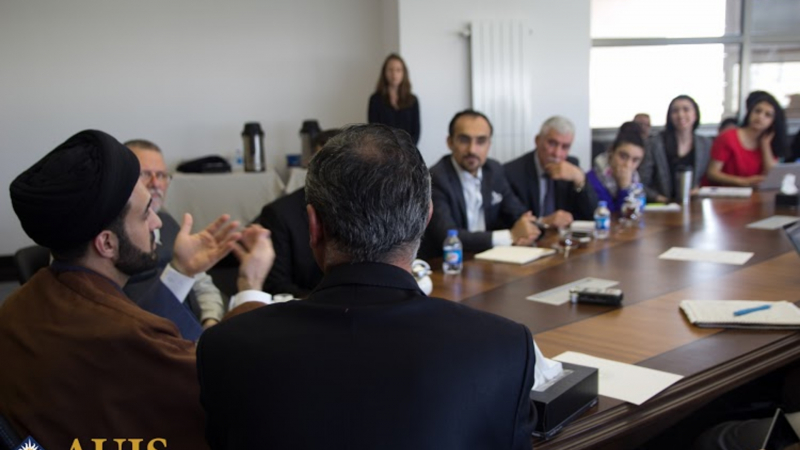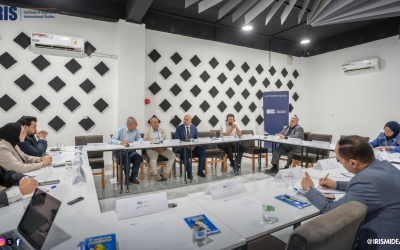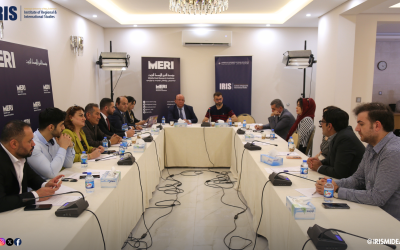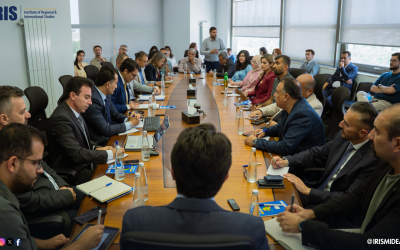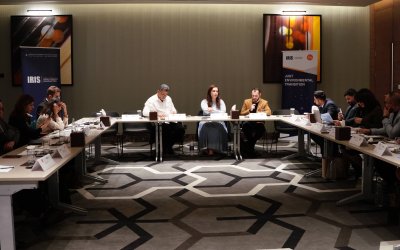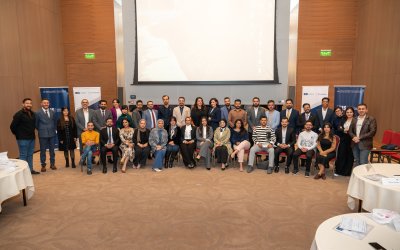On April 12, 2016, IRIS and AUIS hosted a roundtable discussion with Sayyid Jawad Al-Khoei, Secretary General of the Al Khoei Institute in Najaf, about the current role of Najaf, the Marjayia in Iraq and the Middle East region. As a vocal champion of interfaith dialogue and the UNESCO Chair for the Development of Interreligious Dialogue Studies in the Islamic World at the University of Kufa, Sayyid Jawad had an open and honest exchange with AUIS students, faculty members and representatives of Christian and Yezidi communities on issues of religion, politics, and coexistence.
Separation of Mosque and State
Sayyid Jawad discussed at length the importance of the separation of mosque and state. Najaf supports a secular, civil state, he emphasized, as opposed to one based on religious considerations. “A ruler should just be a ruler, no matter what his religion is,” he asserted, noting that neither is it the role of a religious cleric to “put people in prison.” Sectarian considerations should also be far from governance: “If I am to choose between an oppressive Shi’a ruler and normal Sunni leader, I will choose a normal Sunni leader,” he added, quoting Imam Hakim. Finally, Sayyid Jawad explained that there is room for both religion and secularism in society and that there is no contradiction between them, referring to the fact that many prominent pious figures call for secular governments. “We are both secularists and Muslims,” he stated.
Najaf and Politics
Sayyid Jawad also discussed the currently political strife in Baghdad, expressing disappointment vis-à-vis institutions and elected officials in general. Regarding the “Shi’a” parties in the Iraqi Parliament, he said that their message and platform “has nothing to do with Shi’ism or Islam.” He referred to Najaf’s calls for reform and change in the way the country is governed, and questioned the validity and feasibility of reform when it comes from the corrupt, “Reform coming from a corrupt person, I don’t think this works,” he argued.
Responding to a student question about Najaf’s views on the role of women in politics, Sayyid Jawad claimed that any qualified female politician should be allowed to run for office. He continued that in his perspective, religious Shi’a women were more free and open than non-religious women.
Following his belief in the separation of mosque and state, he clarified that Najaf does not wish to play a role in politics, because clerics’ expertise lies in religious affairs, not governance. Members of society should operate within their respective fields. The Marjayia does not have military or political establishments and rather intervenes in questions of science and education.
Daesh and al Hashd al Shaabi
In a discussion about regional geopolitics, Sayyid Jawad argued that both Al-Qaeda in Iraq (AQI) and Daesh were offsprings of Wahhabism and its extreme interpretation of religion, not Sunni Islam. He also highlighted the immense suffering of the Sunni community both at the hands of Daesh and as a result of political marginalization. To him, Daesh’s struggle is not one of religion, but rather one between civilization and barbarism.
Sayyid Jawad used the conflict against Daesh to further support his argument against sectarianism in politics. For example, al Hashd al Shaabi, or Popular Mobilization, resulted from Ayatollah Sistani’s call for all Iraqis, not just Shi’a, to fight Daesh. While this militarization of society is necessary now to defeat ISIS, in two or three years, when the security threat has diminished, groups must lay down their arms and struggle with “the most genuine and powerful of weapons: knowledge.”
Iran and Wilayat al-Faqih
AUIS Professor Bilal Wahab asked Sayyid Jawad about the role of Iran and of the Wilayat al-Faqih doctrine, considered to be the central axis of contemporary Shi'a political thought. Sayyid Jawad said that a minority of believers adhere to this idea that a Shia scholar, such as Khomeini, can rule in the name of God and the absence of the 12th Imam. He said that this doctrine was politicized in 1979 during the Iranian Revolution. In Najaf, Ayatollah Sistani supports the Wilayat al-Insan, which grants responsibility to all human beings for their individual actions. He also referred to the Wilayat al-Ummah doctrine, according to which people should be responsible for electing their representatives. Regardless of the doctrine they follow, all believers should agree that only prophets have the right to govern in the name of God, Sayyid Jawad argued. He however concluded by saying that there should not be a hierarchy of those doctrines -- none is superior to the others.
Najafi Shi’ism and the openness of the Marjayia
Sayyid Jawad described the unique openness of Najaf, which reflects its brand of Shi’ism. The city is diverse and tolerant; it is the only Islamic city where a Communist Party flag flies and unlike other Islamic holy cities, anyone can visit its shrines, regardless of his or her faith or political views. Anyone interested in learning about Najaf and Shi’ism is welcome to study in the city’s institutions.
Most importantly, in response to a student’s question about the protection of Ezidis in Iraq, Sayyid Jawad said that he could not imagine an Iraq without its diverse communities -- refusing to use the term minorities and stressing their foundational role as the “original communities of Iraq.” As the majority, he added, it is the Shi’a community’s moral responsibility to protect Iraq’s other ethno-religious groups.
Ending on an optimistic note, Sayyid Jawad highlighted the fact that, throughout history, no country has ever achieved democracy, security, and freedom overnight. He thus called upon young Iraqis and students to pay closer attention to their country’s governance, and to become more actively involved if they truly want to see things change.








